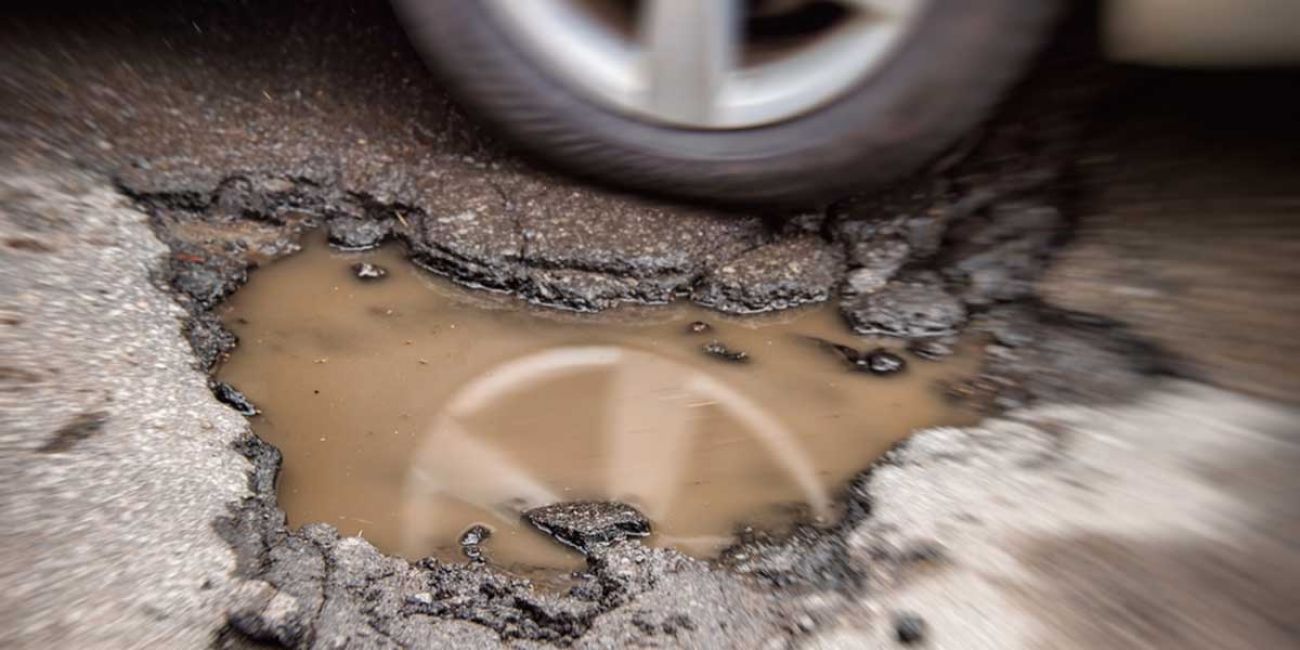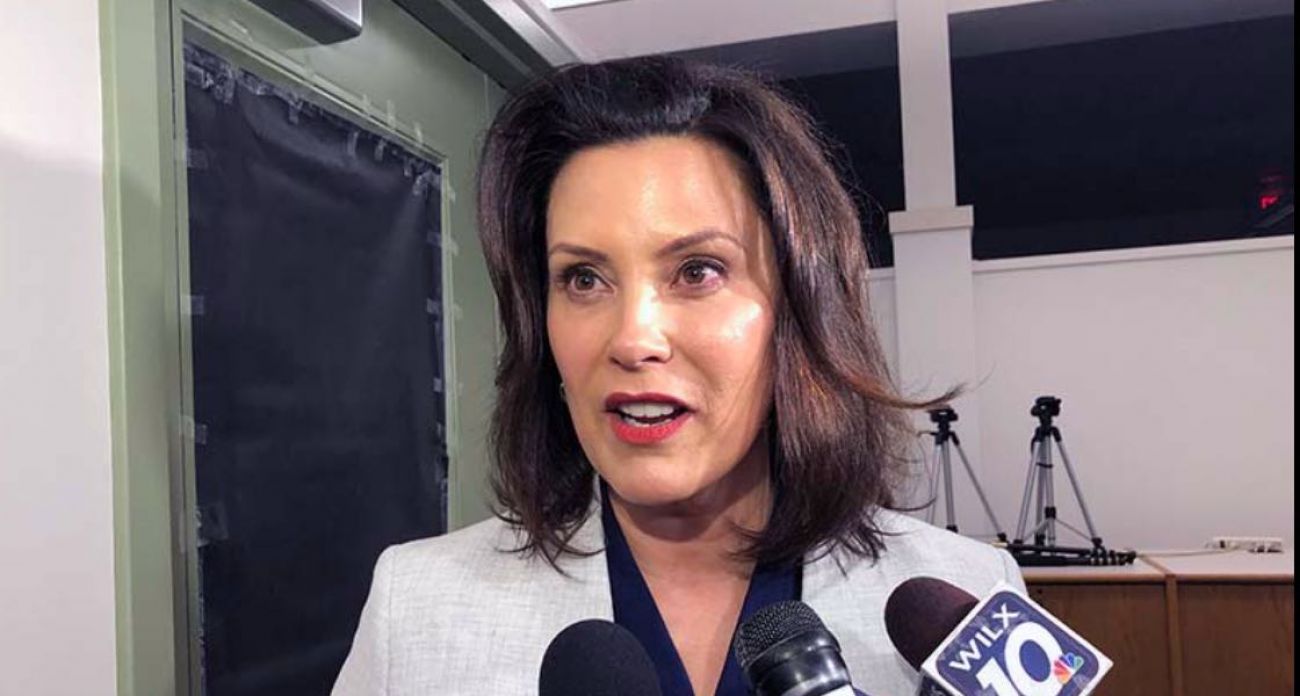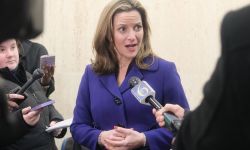A deal to fix Michigan’s roads looks to roll into summer, at least

Related: Michigan Senate panel rejects Whitmer gas tax, as budget dance continues
The debate over how to pay to fix Michigan’s crumbling roads likely will stretch into summer.
That’s when Republican lawmakers in the Senate say they anticipate being ready to publicly share their alternative to Gov. Gretchen Whitmer’s plan to raise gas taxes by 45 cents per gallon to raise the extra $2.5 billion needed annually for roads. The House, meanwhile, has not committed to a specific deadline to release its road-funding plan.
Whitmer, a Democrat, kicked the road-funding ball firmly into the Legislature’s court when she presented her 2020 budget in March, telling lawmakers that through a single vote, they can provide funding for roads, public schools and clean drinking water.
GOP legislators, who control the budget process, oppose Whitmer’s gas-tax increase and say they are still working to find consensus in their own ranks over how they want to fund road repairs. And some legislators are not in full agreement with Whitmer over the amount of new revenue her administration says is needed for roads.The early clashes over roads between Whitmer and Republican legislative leaders are not insurmountable, according to Lansing political insiders, who say that despite some public posturing, both sides appear willing to compromise.
Related Michigan roads stories:
- No escaping billions of dollars needed for Michigan road fix, experts say
- Gretchen Whitmer’s plan to fix Michigan roads: Nearly triple gas tax
- Tell us how YOU would fix Michigan’s roads
- Opinion | As we fix Michigan’s damn roads, fix the damn funding formula
- Opinion | My Michigan roads plan won’t break your pocketbook
That will be important if they are to avoid a budget showdown that lasts into the fall, leaving Michigan without a final spending plan when the new fiscal year starts in October — the kind of impasse that led to brief government shutdowns in the 2000s during Michigan’s last era of divided government, under then-Democratic Gov. Jennifer Granholm.
Right now, Whitmer has the upper hand in negotiations because hers is the only road-funding proposal on the table, and she’s using her statewide bullhorn to control the roads narrative, said John Sellek, a Republican strategist and CEO of Harbor Strategic Public Affairs.
Whitmer has presented her budget to groups in cities across the state since she rolled out her proposal in early March, including in Eaton County and Traverse City this week.
That poses a challenge for Republicans in the Legislature, since they didn’t have their own proposals right out of the gate, Sellek said. Even though it’s not unreasonable to expect it might take awhile to develop a proposal with so many new lawmakers taking office in January due to term limits, he added, voters will want to see results.
“That’s what the governor is counting on,” he said. “If there’s more orange barrels along the side of the road starting next year, she wins, no matter how we get to those barrels.”

A compromise seems possible because no one disagrees that there’s a road-funding problem, said John Cherry, a Democratic former state lawmaker and Granholm’s lieutenant governor. That doesn’t mean it will be easy.
How Whitmer and GOP legislative leaders settle on a deal could send some of the strongest signals yet in this new period of split-party control about how they will be able to jointly solve some of Michigan’s most pressing problems.
“It’s a tough issue to resolve,” said Paul Hillegonds, a former Republican state House speaker and state representative from 1979 to 1996.
“I think it becomes a defining issue for how the governor and the legislative leaders and their caucuses are going to work together over the next two years,” said Hillegonds, himself a veteran of divided government, having shared the speaker role with Democrat Curtis Hertel Sr. in the 1990s.
More money, but how?
One starting point they have in common: Whitmer and lawmakers from both parties agree that improving Michigan’s roads are a top priority, and more revenue is needed.
But they quickly diverge from there. Whitmer sees the 45-cent gas tax increase, spread out over a year, as the best way Michigan can quickly stop roads from deteriorating more than they already are. Republicans disagree.
Her proposal would generate $2.5 billion in new revenue that would prioritize the most heavily traveled roads, with the goal of getting 90 percent of state freeways and highways into good and fair condition by 2029.
State senators, meanwhile, say they intend to submit a budget to Whitmer in early June that will include more funding for roads than today, possibly by redirecting existing spending, but will not include a longer-term funding solution, Senate Majority Leader Mike Shirkey, R-Clarklake, told reporters Thursday.
That longer-term proposal also is expected to be ready by the summer, Shirkey said. He said he wants to avoid delaying work on other parts of the state budget by sending Whitmer a budget with more road funding for 2020, while talks continue on broader road-funding policy bills that could have fiscal implications beyond next year.
“It’ll be substantially more funding for roads on a perpetual basis,” he said of the longer-term proposal. “Whether it includes new revenue or not is still being worked on.”
Whitmer countered that tackling road funding separately from the rest of the budget would not achieve her goal of funding several high-priority programs at once.
“If someone has an alternative that raises $2.5 billion and it’s dedicated to roads, I’m all ears. But it’s all connected,” Whitmer told reporters Wednesday after presenting her budget proposal at a high school in Delta Township, west of Lansing. “It can be in separate bills, but it has to happen at the same time.”
How much new revenue will be raised remains another open question. Whitmer and legislative leaders from both parties say they continue to talk privately in weekly meetings.
Shirkey said he disagrees with Whitmer’s assertion that Michigan needs another $2.5 billion per year in road funding, on top of current spending levels. Instead, Shirkey said an anticipated $2 billion-plus in new road funding should include the $1.2 billion previously adopted in 2015.
That would mean finding another $1 billion or $1.2 billion in additional revenue, he said.
House Speaker Lee Chatfield told reporters Thursday that House Republicans will put additional revenue into roads, but “I’m not going to box myself in on a certain amount.”
Chatfield, R-Levering, would not divulge details of what House Republicans might propose, other than to say it would contain more funding for roads and that new funding would not come from Whitmer’s proposed 45-cent gas tax increase.
He also would not say when the House plan will be publicly unveiled.
“Our goal is to ensure that a responsible budget is done before Oct. 1, whatever time that may be,” Chatfield said.
Chatfield has been on record saying the state’s road-funding problem is rooted in the fact that drivers pay Michigan’s 6 percent sales tax when they fill their gas tanks, but the sales tax revenue goes to schools instead of roads.
What does a compromise look like?
A starting point for a deal is for legislative leaders and Whitmer to agree up front on the scope of the state’s infrastructure needs, the amount of money it will take to address them, and how quickly they need to be addressed, Hillegonds said.
Hillegonds, now CEO of the Michigan Health Endowment Fund and chairman of the Regional Transit Authority of Southeast Michigan, worked on a road-funding proposal as part of a bipartisan group of former legislators that has called for raising the gas tax by nearly 50 cents over nine years. (The Consensus Policy Project is being funded by The Center for Michigan, a nonprofit, nonpartisan organization of which Bridge Magazine is a part. Bridge’s editorial staff has no role in the venture.)
Hillegonds said he supports Whitmer’s proposal for the amount of revenue it generates through the gas tax, but said he would prefer to see the increase phased in over a longer period of time. Hers would be a difficult proposal to bring to the Republican House caucus, he said, but it’s also an issue that would require bipartisan votes.
Term limits also make it more difficult for legislators today to take political risks by voting for tax increases, for fear of blowback in the next election, he said. But, he added: “I’m not aware of anyone in the Legislature who has lost a seat over voting for transportation funding, a fuel tax.”
“I’m sure the Republicans are having a heck of a time figuring out what that counter proposal should look like,” Hillegonds said. “There are probably differences of opinion within the caucus.”
Whitmer has put Republicans in a tough spot, agreed TJ Bucholz, a Democratic strategist and president of Vanguard Public Affairs in Lansing.
In the end, neither side will get everything they want, he said. For now, “she has pretty much the field to herself...By the time Republicans come to the table in the summertime with their own proposal, she’ll have had the opportunity to sell her plan for months.”
Bucholz said he doesn’t expect a budget any earlier than late summer, in contrast to legislators’ practice of finishing budgets before they leave for summer recess during Republican Gov. Rick Snyder’s two-term tenure.
Setting the calendar is “one of the few controls that Republicans have here at the moment,” Bucholz said.
The Michigan Infrastructure & Transportation Association, which represents road builders in the state, said it is willing to support a variety of ideas so long as they raise enough money to adequately fix the roads and that new revenue is constitutionally protected, said Mike Nystrom, its executive vice president. Redirecting existing spending to roads is not protected the same way as the gas tax, he added.
Whitmer’s plan raises enough money to solve the roads issue, Nystrom said, while Chatfield also is correct in wanting to tackle the sales tax paid on gasoline.
One idea the road-builders group is considering pushing is to phase in a 45-cent gas tax increase over a longer period of time, while simultaneously phasing out the sales tax at the gas pump, Nystrom said. That would give policymakers time to make up the revenue that would be cut to the state’s public schools fund by ending the sales tax on gasoline.
“It brings both ideas together, ultimately,” he said. “Give something to the taxpaying, driving public that fixes their roads and reduces their burden, or at least balances their burden.”
Whitmer’s likely to agree to a compromise, since a deal on roads would mean a victory on her signature campaign issue, regardless of whether it ultimately includes a 45-cent gas tax increase, Sellek said.
But don’t expect her to make the first move. It’s up to Shirkey and Chatfield to deliver an alternative plan for which they can deliver a majority of votes in the Legislature, he said.
“Only then can they start negotiating,” Sellek said. “And only then would anyone advise the governor to back off the plan she proposed.”
See what new members are saying about why they donated to Bridge Michigan:
- “In order for this information to be accurate and unbiased it must be underwritten by its readers, not by special interests.” - Larry S.
- “Not many other media sources report on the topics Bridge does.” - Susan B.
- “Your journalism is outstanding and rare these days.” - Mark S.
If you want to ensure the future of nonpartisan, nonprofit Michigan journalism, please become a member today. You, too, will be asked why you donated and maybe we'll feature your quote next time!




